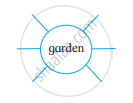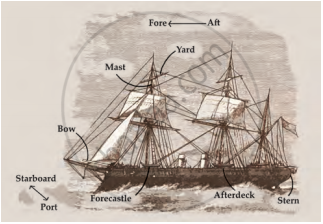Advertisements
Advertisements
Question
Notice these expressions in the poem and guess their meaning from the context:
| rancid breath | squelching tar |
| spectroscopic flight of fancy | |
| rearing on the thunderclap | brunette |
| peroxide blonde | clinical assent |
| raven black |
Solution
- rancid breath: Rancid means a matter which is offensive or disagreeable. Thus, the voice in which the lady speaks to the poet is under an immensely nasty or insulting breath.
- squelching tar: The verb squelch means to strike or press with crushing force. Thus, the expression used here is that of a huge amount of compressed tar, the dark coloured product obtained after distillation of coal or wood, expressing the complexion of the poet.
- spectroscopic flight of fancy: The word spectroscopy originated from the concept of dispersion of visible light into seven different colours. Thus, the word explains the dispersed flow of thoughts of the lady after talking to the erudite poet. Her fancies of a “dark” man gained wings and attained new levels of interpretations when she had to submit to the fact that she knew lesser than the person on the other side of the line.
- rearing on the thunderclap: A thunderclap refers to something resembling the sudden occurrence of a thunder, as in loudness or unexpectedness.
- brunette: Brunette here refers to dark hair and, often, dark eyes and darkish or olive skin.
- peroxide blonde: This expression refers to a harsh or unnaturally bleached palm and sole of feet rather than a natural fair complexion. Peroxide is a chemical which is used as a bleaching agent.
- clinical assent: The voice of the lady in the poem seemed clinical while assenting to the poet's revelation. It refers to the concerned voice based on a vivid and actual observation of the poet, giving in to the situation after a lot of thought and inspection.
- raven black: Here, raven black is a metaphorical expression to describe the intensity of the colour black. Raven is supposedly a very large, dark-complexioned bird of the crow family. This metaphor is usually used to describe dark-skinned people.
APPEARS IN
RELATED QUESTIONS
Tick the item that is closest in meaning to the following phrase.
to be wound up
What were the voices that Paul heard? Did they lead him to success in the real sense?
Go through the poem and state whether the following statement is true or false.
Planners are concerned about the environment of the area.
Find at least five other Akbar and Birbal stories and share them with your friends. Make a list of the stories collected by the entire class. Put your list in alphabetical order.
Describe the following with the help of the story.
The fabric is woven by Thiruvalluvar
Shakespeare’s poetry has come to be valued for its own sake on the stage. Comment with reference to the play ‘A Midsummer Night’s Dream.’
Find, in your science textbook, the topics of the stalls handled by students of VI A.
(Write the page number.)
What is your favourite time of the day? Describe it in detail.
Draw word webs for the following. Begin with the given word and go on writing as many other words associated with it, as you can. Use these words to write other related words to form a word web.

Read the passage aloud playing the roles of the different characters.
Think and answer:
Does the last line make you happy or sad? Why?
How long does the whole event described in this passage take? Work it out by reading the passage.
Observe the picture and the labels carefully. Then match the words and the meanings given in the following table.

| Words | Meaning |
| 1. yard | (a) a floor, flat area built on a ship |
| 2. mast | (b) the forward part of the main body of a ship |
| 3. bow | (c) the forward part of a deck |
| 4. deck | (d) tall, upright pole on a ship |
| 5. forecastle | (e) a pole slung across a ship’s mast. A sail hangs from a yard. |
| 6. starboard | (f) the rearmost (back) part of a ship |
| 7. stern | (g) the part which is always at the front while the ship is sailing. |
| 8. afterdeck | (h) the right-hand side of a ship as one faces forward |
| 9. fore | (i) an open deck near the back |
Find the meaning of the following words or phrases :
- ridges
- brimming
- eddying
- babble
- fallow
- trout
- netted
Find from the Internet and write down.
From which play is this song extracted?
Do you agree with the poet’s thoughts? Why?
What did the Judge tell Ahmad?
What is meant by being ‘offline’?
Identify the character/speaker.
I'll see you later at the Queen's croquet game.
The hatchlings use a tiny egg-tooth to come out of the eggs.
What are the two reasons the author gives for the plants moving towards grandfather?
Women/Men can achieve anything, provided they put their heart and soul into it. Discuss in the class. Do you think being a man or a woman makes a difference?
Fill in the blanks to complete the summary.
Ever since their introduction, ______, and their unique rhythms have ______ poets. In this poem the poet shares his experience ______ with us. He presents natural scenes seen from ______ a railway carriage. The ______ is regular and steady but ______ from the window of the train is constantly changing. The poem’s rhythm and phrases bring ______ of a railway journey. The poet looks out of the window at the ______ images outside. Every line we see here is a quick account of something seen for ______. The line that best sums up is the final one: "Each a glimpse and gone forever!"
Gulliver was hailed as a hero because he ______.
The scene is set inside a thick forest and it is nearing dusk. Relate this time frame with the behaviour of the animals in the forest.
Look at the picture and tick Choose the correct word.

What was the age of Robinson Crusoe when he left for sea?
Parents never let us get ______.
Name the character or speaker.
"Do you have a fever?"
Why did Tenzin cry every day?
